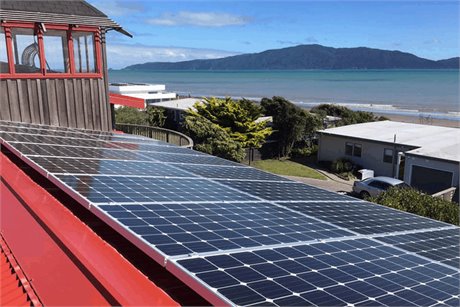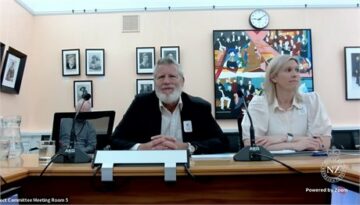 |
| Rooftop solar Kapiti Coast: GreenVan Electrical |
By Jeremy Rose
Labour and the Greens are both promising subsidies for rooftop solar, despite experts – including the Climate Change Commission chair – saying regulatory barriers and grid limitations are the main reasons households and businesses aren’t taking advantage of the renewable energy going to waste on their roofs.
The Green Party last month announced its policy of a Clean Power Payment that includes grants of up to $6000 and interest free 10 year loans of up to $30,000 for energy efficient improvements to their homes – including rooftop solar and batteries.
Labour’s proposal, announced on Monday, would see households eligible for $4000 grants – $2000 to go towards the rooftop panels and $2000 for a battery.
Back in April, Climate Change Commission chair Rod Carr told Carbon News he wasn’t a fan of rooftop solar subsidies.
“The economics of solar are now such it doesn’t need government subsidies. The barriers to more rapid uptake of solar are regulatory barriers and technology constraints on the grid and the lines.”
He said for the approximately one third of New Zealand houses that are suitable for solar – due to facing the right way and not being in the shadow of trees or other buildings – solar was already a no-brainer.
“The financial system and households, where appropriate, will do rooftop solar, for use behind the meter. And that pays for itself in about eight years. So all of that works now without subsidy.”
Simon Orme, an Australian energy transformation and emergency planning consultant based in Wellington, says New Zealand is way behind Australia in the uptake of rooftop solar.
“Queensland, with a similar population to New Zealand, already has more than 5TWh of rooftop solar output. That’s nearly double New Zealand’s entire wind output (2.62TWh). That’s 25 times New Zealand’s reported rooftop solar output of 203GWh.”
In New South Wales more than 800,000 household have solar system saving them an average of $600 a year in power bills, Orme says.
“There’s nothing wrong with the economics. There is plenty of sun in most of New Zealand and costs here should only be slightly higher than in Australia, reflecting slightly lower annual sunshine hours.
He says with New Zealand electricity demand peaking in winter, unlike Australia where it peaks in summer, the country’s low voltage network could handle a lot of rooftop solar before capacity needed expanding.
And Orme says rooftop solar – both home and commercial – should be considered as an alternative to the Lake Onslow pumped-hydro battery proposal.
“Rooftop solar is clearly the cheapest solution to the dry year problem – low lake infills reducing hydro electricity output. The dry year problem is what is keeping Huntly open indefinitely.”
“When compared with Lake Onslow, rooftop solar is far more cost effective. Rooftop solar could be energised at scale within a few years. Lake Onslow isn’t scheduled to be commissioned until the late 2030s and there is every chance of project slippage till the 2040s.”
Leave it to the market: ACT
The ACT Party is against a subsidy and its climate change spokesperson, Simon Court, says household rooftop solar would make little difference to overall electricity consumption in New Zealand.
And he’s not convinced the average punter would be keen on having a solar array on their roof.
“By the time you’ve had someone clambering over your roof, and you’re told the panels have a 10 to 15 year warranty on them. A lot of people feel very nervous about that, about having that liability on the roof and what it means. And then people are also rightly concerned about the waste disposal.”
Rooftop solar on commercial building has real potential, he says. But there’s no need for government subsidies.
“When I fly into Auckland Airport I see what seems to be hectares and the hectares of roof space, which could potentially hold rooftop solar.”
He says businesses will install rooftop solar based purely on the economics of whether it makes sense to them.
It makes no sense, Court says, to over-build renewables with a lot of households taking on the risk of solar when natural gas provides a more affordable solution to shortfalls in renewable energy generation.
Te Pāti Māori wants solar on marae and kura
Te Pāti Māori is proposing a $1 billion Pūngao Auaha fund for Māori-owned community energy projects and solar panel and insulation instillations on marae, kura, homes and papakāinga housing developments.
When asked if it supported subsidies for rooftop solar, a spokesperson for the National Party replied it had not released a policy on solar power but gave no indication of whether one was in the wind.
New Zealand First deputy leader Shane Jones says the party Is open minded to the idea of subsiding rooftop solar but its main focus is comprehensive energy strategy which includes the establishment of a stand alone “comprehensive energy agency.”
“This will signpost the energy mix and give timeframes which are reflective of the actual position of our industrial base.”
The case for a plan
Energy expert Simon Orme says it is shocking New Zealand hasn’t got a national energy plan. “There is just a plan to have a plan by the end of 2024.”
Rooftop generation in New Zealand produces only 203 GWh. “That’s a fraction of wind and a fraction of coal.”

He says that, unlike New Zealand, Australian governments all support solar power because it’s one of the cheapest clean sources of energy available. “It reduces household bills, reduces emissions and improves resiliency, including during and after emergencies.”
The Green Party says the electricity market needs to be fundamentally reformed to speed up the uptake of renewable energy.
It says it will remove market structure incentives for fossil fuel use in generation, and require transparent wholesale pricing systems.
“We must also scale up support for community energy solutions, including community and marae-based clean-energy hubs, with solar and wind generation, local markets, battery storage solutions and peer-to-peer retail trading.”
Labour says it is investigating whether new or enhanced market measures are needed to support the transition to a renewable electricity system.
In response to a written question asking whether the energy market needed to be reformed to reach the 2030 100% renewable target, a spokesperson replied: “National does not support the 100% renewable electricity target.”
Act simply said: “No.”
TOP and Te Pāti Māori didn’t respond to Carbon News’ list of political questions and there’s nothing on either of their websites specifically about the electricity market.
- SEO Powered Content & PR Distribution. Get Amplified Today.
- PlatoData.Network Vertical Generative Ai. Empower Yourself. Access Here.
- PlatoAiStream. Web3 Intelligence. Knowledge Amplified. Access Here.
- PlatoESG. Carbon, CleanTech, Energy, Environment, Solar, Waste Management. Access Here.
- PlatoHealth. Biotech and Clinical Trials Intelligence. Access Here.
- Source: https://www.carbonnews.co.nz/story.asp?storyID=28784
- :has
- :is
- :not
- :where
- $1 billion
- $UP
- 000
- 1
- 10
- 11
- 15%
- 2024
- 2030
- 25
- 33
- a
- About
- Act
- actual
- ADvantage
- affordable
- After
- against
- agency
- airport
- All
- alone
- already
- also
- alternative
- an
- and
- announced
- annual
- appropriate
- approximately
- April
- ARE
- Array
- AS
- asked
- asking
- At
- Australia
- Australian
- available
- average
- barriers
- base
- based
- batteries
- battery
- battery storage
- BE
- because
- before
- behind
- being
- Billion
- Bills
- both
- Building
- buildings
- businesses
- but
- by
- Capacity
- case
- Chair
- Chance
- change
- cheapest
- clearly
- Climate
- Climate change
- CO
- Coal
- Coast
- commercial
- commission
- community
- compared
- comprehensive
- concerned
- considered
- constraints
- consultant
- consumption
- convinced
- Cost
- Costs
- could
- country’s
- Court
- Demand
- deputy
- Despite
- developments
- didn
- difference
- do
- does
- doesn
- double
- dry
- due
- during
- Economics
- Effective
- efficient
- eight
- either
- electricity
- electricity consumption
- eligible
- emergency
- Emissions
- end
- energy
- Energy Market
- energy projects
- Energy Solutions
- enhanced
- Entire
- establishment
- Every
- expanding
- expert
- experts
- facing
- fan
- far
- feel
- few
- financial
- financial system
- First
- Focus
- For
- fossil
- Fossil fuel
- fraction
- Free
- Fuel
- fund
- fundamentally
- GAS
- gave
- generation
- Give
- Go
- going
- got
- Government
- Governments
- grants
- Green
- Grid
- had
- handle
- Have
- having
- he
- here
- higher
- hold
- Home
- Homes
- HOURS
- household
- households
- houses
- housing
- HTTPS
- hubs
- i
- idea
- if
- improvements
- improves
- in
- Incentives
- includes
- Including
- indication
- industrial
- install
- interest
- into
- investigating
- IT
- ITS
- itself
- jones
- jpg
- just
- Keen
- keeping
- lake
- Last
- Late
- leader
- liability
- light
- limitations
- lines
- List
- little
- Loans
- local
- Lot
- Low
- lower
- Main
- make
- MAKES
- Market
- Market Structure
- Markets
- means
- measures
- minded
- mix
- Monday
- Month
- more
- most
- must
- National
- Natural
- Natural Gas
- nearly
- Need
- needed
- needs
- network
- New
- New South Wales
- New Zealand
- news
- no
- normal
- nothing
- now
- of
- on
- ONE
- only
- open
- or
- Other
- our
- output
- over
- overall
- panel
- panels
- party
- pays
- peer to peer
- People
- plan
- planning
- plato
- Plato Data Intelligence
- PlatoData
- Plenty
- policies
- policy
- political
- population
- position
- potential
- potentially
- power
- pricing
- Problem
- produces
- project
- projects
- promising
- proposal
- proposing
- provides
- purely
- question
- Questions
- rapid
- RE
- reach
- real
- reasons
- reduces
- reducing
- reflecting
- regulatory
- released
- remove
- Renewable
- renewable energy
- Renewables
- Reported
- require
- Respond
- response
- retail
- Retail Trading
- right
- Risk
- roof
- s
- Said
- saving
- saying
- says
- Scale
- scheduled
- scoop
- see
- seems
- sense
- Shadow
- should
- similar
- Simon
- simply
- slippage
- So
- solar
- solar panel
- Solar Power
- Solar system
- solution
- Solutions
- Someone
- Sources
- South
- Space
- specifically
- speed
- spokesperson
- stand
- storage
- Strategy
- structure
- subsidy
- such
- suitable
- summer
- Sun
- sunshine
- support
- Supported
- system
- Systems
- T
- taking
- Target
- Technology
- than
- that
- The
- The Greens
- their
- Them
- then
- There.
- Third
- till
- time
- times
- to
- told
- towards
- Trading
- Transformation
- transition
- transparent
- Trees
- unlike
- until
- uptake
- use
- Ve
- very
- Voltage
- wants
- was
- Waste
- Way..
- websites
- What
- What is
- when
- whether
- which
- wholesale
- will
- wind
- Winter
- with
- within
- without
- works
- would
- written
- Wrong
- year
- years
- you
- Your
- Zealand
- zephyrnet












